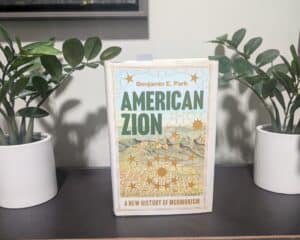I’ve spent a lot of time reflecting on the many ways in which Mormon feminism has helped me grow as a person and how it (the community, huge body of writing, friendship, accountability, learning from many things going wrong), has taught me so many valuable lessons. One of the lessons that I keep bumping up against these days is that we always live our lives in relation to patriarchal institutions.
We can point to the LDS Church and many other religious institutions as sources of patriarchal oppression in our lives, but we will also spend our lives navigating various patriarchal institutions outside of religion. The kinds of creative navigation of choices that I have seen discussed and modeled in Mormon feminism have served me well in life. I can acquiesce to expectations, I can resist expectations, I can create or find other options that allow me to preserve my integrity. The only choice I cannot make is to live a life without such institutions, whether that is church, school, my university, government, supermarkets, whatever. Some institutions will be more patriarchal (LDS Church) and some will be less patriarchal (my local public library, the local LGBTQ+-friendly coffee shop), but they will all uphold, consciously or unconsciously, a hierarchy of bodies and identities that prioritize the needs of straight white cisgender men.
Some organizations will go out of their way to prioritize other identities. I loved my time as a camper and counselor at Girl Scout camp. I love the various feminist organizations, retreats, and conferences that I participate in. I have learned a great deal from watching Black Lives Matter at work here in Utah and from Equality Utah, Affirmation, Harmony, and the other LGBTQ+ organizations that I follow. I am trying to pay more attention to folks who are speaking about disability and church and the way that neurodivergent people experience the world and its institutions. And none of them have perfectly excised patriarchy, with its inherent homophobia, transphobia, racism, and ablism, from their boards, programs, curricula, or structures. I love these organizations for being on a journey to try and do these things. I also recognize that none of them will ever fully arrive, that I will never fully arrive, but I wish to participate with them in the work of growing more fully into the values we share. We do that by pointing out the gaps between lived experience and our values and then by hearing folks out and finding ways to do better. It is good work. It is imperfect and painful work.
I also believe that it is the work of the gospel. It is about seeing the humanity and dignity in other people and finding ways to hear and honor that dignity. At this stage of my faith, I recognize God as the Holy Other and that we all hold the image of God in us. To find reconciliation, justice, and peaceful thriving in community and across difference is to honor the image of God in others. In the name of Jesus, the peaceful one. Amen.






5 Responses
“I also recognize that none of them will ever fully arrive, that I will never fully arrive, but I wish to participate with them in the work of growing more fully into the values we share.” I’ve had similar thoughts. It seems like important work to find places to be in community through the struggle of growth, while recognizing that neither I nor any institution or group or business will fully arrice.
“We do that [Participate in groups that value people connection over people talking in authority over each other] by pointing out the gaps between lived experience and our values and then by hearing folks out and finding ways to do better.”
For me, this “hits home” in terms of parenting. One of my missions in life right now is to set up an environment where my children are exposed to my values and what I find valuable.
With one child, it is “easy” to transfer/foster my values into her value system. She is 6, so she “values” my approval and attention equal to and/or more then what I actually value and share with her. She also likes candy/bribery in general:)
With another child, I need to have a chess board diagram set up of how to “entrap” her into exposure to my values [note – just exposure – I don’t want to presume that I impose my values even if I wanted to]. I am told (loosely) that this is what is expected for a teenager – and that I have years and years of this. I remind myself of what Robert Fulghum put into words, “Don’t worry that children never listen to you; worry that they are always watching you.”
So while I want a “meeting of the verbally-based minds” with her using words to create a sustaining environment and other lofty ideals, sometimes I am able to be “a better, more disciplined actor” when I remind myself who my “audience” is.
This is really beautiful, Nancy, and puts into words so many of my own feelings. I’m so grateful for your example and the example of so many others that I’ve met via Mormon feminism to show me that there are so many ways to do this, that we’ll never escape patriarchy, but that there is hope and purpose in trying.
Amen.
I love this testimony.